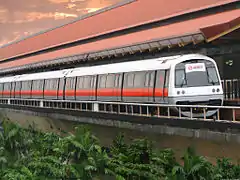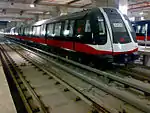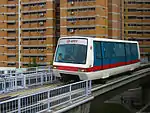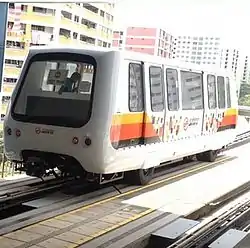SMRT Trains
SMRT Trains Limited is a rail operator in Singapore and a wholly owned subsidiary of SMRT Corporation. After the privatisation of the MRT operations in 1995, it was originally named Singapore MRT Limited. On 31 December 2001, it was renamed to SMRT Trains Limited, so as not to confuse with another MRT line - North East MRT Line that is under Singapore Bus Services and the bus operations merged from Trans-Island Bus Services. At the same time, Singapore Bus Services was renamed to SBS Transit to be multi-modal. SMRT Trains currently manages most of the MRT services in Singapore except the North East Line and Downtown Line.
 | |
 A C151 train operated by SMRT Trains. | |
| Type | Public |
|---|---|
| Industry | Public Transport Operator |
| Founded | Singapore (1987) (as Mass Rapid Transit Corporation) |
| Headquarters | 2 Tanjong Katong Road, #08-01, Paya Lebar Quarter (PLQ 3), Singapore 437161 |
Area served | Singapore |
Key people | Seah Moon Ming (Chairman) Lee Fook Sun (Deputy Chairman, Trains) Neo Kian Hong (Group CEO) Lam Sheau Kai (President, Trains) |
| Services | Railways |
| Parent | SMRT Corporation |
| Website | www.smrttrains.com.sg |
SMRT Trains currently has one subsidiary, SMRT Light Rail, which owns the contract to operate the Bukit Panjang LRT Line.[1]
History
SMRT Trains Limited was incorporated as the rail subsidiary arm of the parent company SMRT Corporation, to oversee rail operations brought over from the previously state-owned Mass Rapid Transit Corporation (MRTC).
Mass Rapid Transit Corporation (MRTC)
The Singapore MRT Limited was incorporated on 6 August 1987, and signed the licence and operating agreement (LOA) with MRTC, a government-run corporation till 1997. On 7 November 1987, MRTC started services on Singapore's first MRT section, consisting of five stations from Yio Chu Kang to Toa Payoh. When the MRTC merged to form LTA on 1 Sep 1995, operations of the MRTC were hived off into SMRT Corporation. On 1998, the light rail operation was formed and was called Singapore LRT Limited. On 31 December 2001, both Singapore MRT Limited and Singapore LRT Limited were merged into the present name, SMRT Trains.
Transition to New Rail Financing Network
On 15 July 2016, SMRT Trains and its subsidiary SMRT Light Rail concluded discussions on the transition of the North-South and East-West Lines (NSEWL), the Circle Line (CCL) and the Bukit Panjang LRT (BPLRT) to the New Rail Financing Framework (NRFF). The framework, announced by the Government in 2008 under the Land Transport Master-plan, was introduced as an enhancement to the 1996 Rail Financing Framework, and was first implemented for the Downtown Line (DTL) in 2011.[2] SMRT transited to a 15-year contract under the new framework from 1 October 2016, with the transfer of ownership of all its rail assets at a net value of $1.06 billion to the government.[3]
Fleet details
The company currently operates a fleet consisting of six rolling stocks built on its two heavy rail lines (the North South Line and the East West Line) – namely C151, C651, C751B, C151A, C151B, C151C and CR151, identified by the relevant build contracts. In addition, it operates the C830 and C830C rolling stocks, which serve the Circle Line. The company is also licensed to operate the CT251 stocks, which operate on the Thomson-East Coast Line. SMRT Light Rail operates the C801 and the C801A stocks on the Bukit Panjang LRT Line. The C851E will be added to SMRT's fleet in tandem with the opening of the CCL6 line.[4]
The main colour scheme for all trains are black with a red stripe, excluding C651 with the only exterior with white and red stripes, C801 with green and red stripes, C151B and C801A will bear the new SMRT pixelated livery, which consist of white, red, black and yellow pixel livery. The new LTA livery, which is black with green and red stripes, will be visible on C151C and CR151 trains.
| Contract* | Image | Type | Maximum Speed (km/h) | Trains | Cars | Line(s) served | Built | Numbers In Service | Introduction | Withdrawn | |
|---|---|---|---|---|---|---|---|---|---|---|---|
| Design | Service | ||||||||||
| C151 |  |
electric multiple unit | 90 | 80 | 66 | 396 | North South Line East West Line |
1986 – 1989 2006 – 2009[nb 1] |
65 | 7 November 1987 | 22 June 2020 - |
| C151A |  |
35 | 210 | 2011 – 2014 | 35 | 27 May 2011 | N/A | ||||
| C151B | _-_C151B_arriving_at_Tuas_Link_MRT_Station_(Kawasaki_Heavy_Industries_%2526_CSR_Qingdao_Sifang_C151B_(KSF)).jpg.webp) |
45 | 270 | 2015 – 2017 | 45 | 16 April 2017 | |||||
| C151C |  |
12 | 72 | 2017 – 2019 | 12 | 30 September 2018 | |||||
| CR151 | 106 | 636 | 2019 onwards | 0 | 2021 onwards (batch 1)
2024 onwards (batch 2) | ||||||
| C651 |  |
19 | 114 | 1993 – 1994 2016 – 2018[nb 1] |
15 | 2 May 1995 | 5 September 2020 - | ||||
| C751B |  |
21 | 126 | 1999 – 2001 | 20 | 28 January 2000 | 21 January 2021 - | ||||
| C830 |  |
78 | 40 | 120 | Circle Line | 2006 – 2008 | 40 | 28 May 2009 | N/A | ||
| C830C | .png.webp) |
24 | 72 | 2014 – 2015 | 24 | 26 June 2015 | |||||
| C851E | 11 | 33 | 2019 onwards | 0 | ~2025 | ||||||
| C801 |  |
55 | 48 | 19 | Bukit Panjang LRT | 1997 – 1999 | 19 | 6 November 1999 | ~2020 onwards | ||
| C801A |  |
13 | 2014 – 2015 | 13 | 19 November 2014 | N/A | |||||
| C801B | 19 | 2018 – 2021 | 0 | ~2021 | |||||||
| CT251 |  |
100 | 90 | 91 | 364 | Thomson-East Coast Line | 2015 – 2020 | At least 5
operationally ready |
31 January 2020 | ||
- The trains are classified as contracts unlike other countries which uses "class".
Notable incidents
- Before the start of service, a maintenance vehicle spilt oil on the tracks between Clementi and Jurong East. The first ten eastbound trains reported braking problems. Then, at 7.50 am on 5 August 1993, the eleventh east-bound train from Jurong stopped at the Clementi Station for two minutes longer than scheduled due to it using its emergency brakes to stop at the station, and was then hit by the twelfth east bound train when it failed to stop in time. 156 passengers were injured by the collision.[5]
- On 15 December 2011, train services were disrupted between Bishan and Marina Bay on the NSL. Two days after, train services were again disrupted between Toa Payoh and Marina Bay. SMRT suspected that the weight of the 4th generation trains, C151A, was the root cause of the breakdown. However, the 4th generation trains were sent back to China since July 2014. SMRT and LTA revealed that all of the critical parts like signalling, sleepers, third rail needs replacement by 2019.
- On 9 March 2015, the BPLRT came to a halt due to a station fire and a power fault, which resulted in a 24-hour service suspension. The cause of the power faults were due to the fire at Senja LRT Station. All trains underwent system checks and both LTA and SMRT engineers inspected the stations and tracks before service could resume. Certain section of tracks deemed as "possible causes of power faults" ran on reduced speed until around the 4th week of July before reinstating normal speed.
- On 7 July 2015, the NSEWL was completely suspended from normal train services. It was also the first time both major lines were suspended simultaneously. SMRT and LTA has suspected that faulty trains were the cause of this incident. Investigations concluded that a damaged insulator was the main cause of the multiple power trips on that day and SMRT could be fined for the lack of maintenance. Experts are looking into the matter to see if they can separate the power systems from the North South and East West Lines to prevent similar incidents form recurring.
- Pasir Ris rail accident: On 22 March 2016, 2 SMRT staff were killed when a train hit them near Pasir Ris station along the EWL. Following an audit and investigation, the Ministry of Manpower (Singapore) reported that SMRT had failed to follow safety procedures to ensure worker safety for the past 14 years.[6] Former assistant engineer Lim Say Heng pleaded guilty to one charge of causing the deaths of the trainees by failing to observe critical safety protocol and was sentenced to four weeks jail.[7]
- On 7 October 2017, train services along the North South Line between Ang Mo Kio and Marina South Pier were disrupted due to flooding of MRT tunnels caused by a pump failure during rain.[8] Train services between Newton and Ang Mo Kio remained unavailable for 21 hours till the afternoon of the following day.[9][10] In the aftermath of the flooding incident, Ng Teck Poo, vice-president of maintenance and systems at SMRT was replaced.[11] Following further investigations, the manager and staff responsible for the maintenance of the pumps were suspended after it was revealed that maintenance for the past three quarterly maintenance (starting from December 2016) may have been falsified.[12]
- Joo Koon rail accident: On 15 November 2017, two C151A trains collided at Joo Koon, injuring 28 people, making the second incident after 24 years on 5 August 1993 when two C151 trains collided at Clementi.
Notes
- Refurbishment.
References
- "About SMRT: Business and Subsidiaries". Retrieved November 4, 2017.
- "SMRT Trains and SMRT Light Rail to Transit to New Rail Financing Framework | Press Room | Land Transport Authority". www.lta.gov.sg. Retrieved 2018-07-29.
- hermesauto (2016-07-15). "LTA to buy $1b of SMRT assets under new rail financing framework". The Straits Times. Retrieved 2018-07-29.
- "New trains for NEL & CCL". April 30, 2018. Retrieved December 24, 2018.
- "First MRT accident | Infopedia". eresources.nlb.gov.sg.
- "SMRT failed to follow safety procedures for 14 years: MOM". TODAYonline.
- "Ex-SMRT engineer jailed 4 weeks over accident which killed two trainees". sg.news.yahoo.com.
- "Timeline of NSL disruption due to flooded MRT tunnel". Channel NewsAsia. 8 October 2017.
- "NSL disruption: Malfunctioning water pumping system resulted in flooded MRT tunnel, says LTA". Channel NewsAsia. 8 October 2017.
- Singapore, Redwire (October 9, 2017). "21-Hour Train Disruption due to Flooding another Warning Sign of MRT System Management Lapses". RedWire Times Singapore.
- "SMRT maintenance Vice-President replaced, news source reports inadequate maintenance of water-pumping system behind tunnel flooding". The Online Citizen. October 12, 2017.
- "In full: SMRT and LTA's statements on the suspected falsification of maintenance records at Bishan station". TODAYonline.
.jpg.webp)